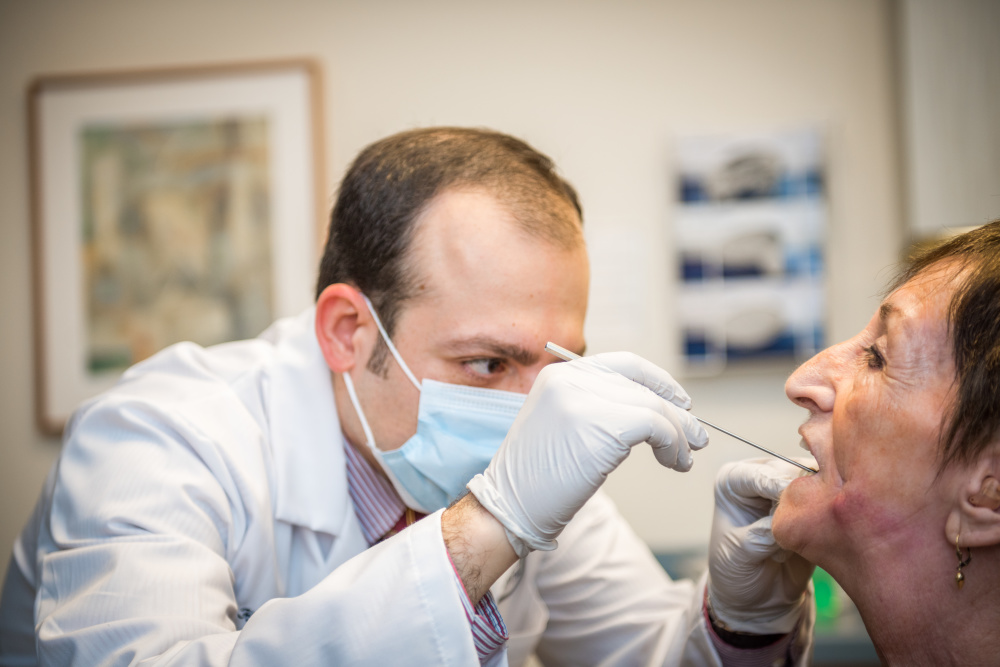 Oral problems such as mouth sores, dry mouth, jaw pain, and sensitive gums are a common complaint for cancer patients, because the very treatments that target fast-growing cancer cells can also affect healthy cells in the mouth. Treatments such as radiation and chemotherapy may cause mouth sores and dry mouth, while some newer targeted therapies may lead to taste changes and oral sensitivity. Patients with head and neck cancers are particularly likely to experience oral problems, because treatments often focus on areas near the mouth and jaw.
Oral problems such as mouth sores, dry mouth, jaw pain, and sensitive gums are a common complaint for cancer patients, because the very treatments that target fast-growing cancer cells can also affect healthy cells in the mouth. Treatments such as radiation and chemotherapy may cause mouth sores and dry mouth, while some newer targeted therapies may lead to taste changes and oral sensitivity. Patients with head and neck cancers are particularly likely to experience oral problems, because treatments often focus on areas near the mouth and jaw.
Here are some tips for dealing with common oral side effects of cancer treatment:
- Bleeding or sensitive gums: Don’t floss areas that are sore or bleeding, but continue flossing other teeth. Before you brush your teeth, use warm water to soften the bristles of your toothbrush.
- Dry mouth (also known as xerostomia): Drink plenty of water, at least eight glasses (about 64 ounces) of water a day. Avoid smoking, caffeine, and alcohol. These can irritate and dry a sore mouth. Your doctor may also recommend over-the-counter products that can help alleviate dry mouth. If you’re looking for foods that may help, Dana-Farber nutritionists offer recipes to help relieve dry mouth.
- Mouth sores (also known as mucositis): Avoid spicy or acidic foods, because they can irritate mouth sores. Soft, bland foods may be easier to eat. Your care team may also recommend that you rinse your mouth regularly using baking soda or warm salt water (dissolve a teaspoon of salt or baking soda into eight ounces of warm water). Talk with your doctor about medicines that may help with pain.
- Pain when eating or swallowing: Talk with your cancer care team about foods that are easier to chew and swallow. Ask about medications that may help prevent sores and ease discomfort. Your care team may also recommend over-the-counter pain relievers, such as Tylenol, to help reduce mouth pain.
To maintain good oral health during cancer treatment, use a soft-bristle toothbrush to brush your teeth three times a day. Floss daily, unless it causes bleeding when your platelet count is low. If possible, try to see your dentist before treatment starts. Your dentist may be able to clean your teeth and check for potential problems that could lead to irritation during cancer treatment. After treatment begins, do not have any dental work done without first checking with your cancer care team.
Call your care team right away if you have swelling, bleeding, or a white, sticky film in your mouth. This can be a sign of infection. You should also call your care team when you notice a new mouth problem, an old problem gets worse, or you discover changes that you’re just not sure about.
Learn more steps you can take to help prevent mouth problems during treatment and tips for mouth care during and after cancer treatment.
The Oral Medicine and Dentistry program at Dana-Farber/Brigham and Women’s Cancer Center helps patients care for their mouth and teeth before, during, and after treatment.
